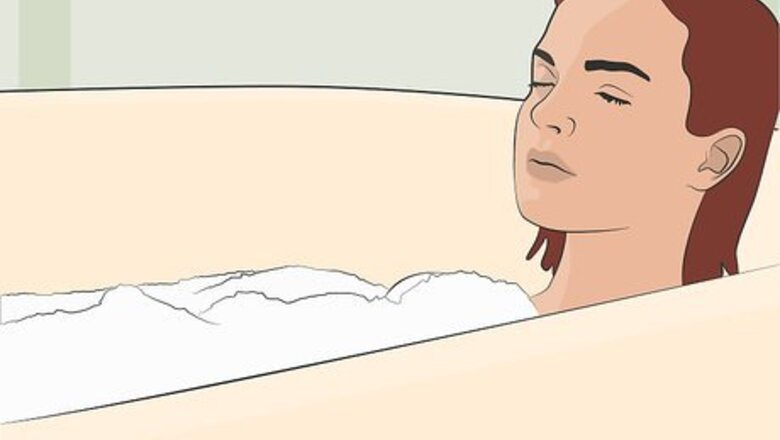
views
X
Expert Source
Mohiba Tareen, MDFAAD Board Certified Dermatologist
Expert Interview
There are also a few other things you can change about your environment and your bedtime routine to ensure you get a good night's rest.
Using Topical Remedies
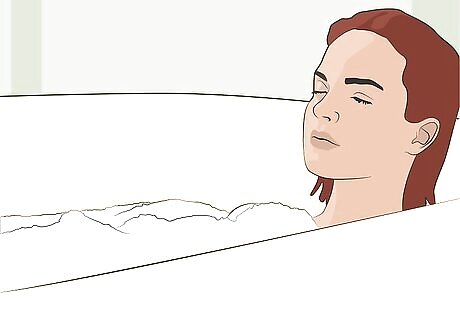
Take a colloidal oatmeal bath before you go to bed. While the tub is filling, add 1 cup (128 g) of colloidal oats and stir it around with your foot. Relax in the tub for at least 15 to 20 minutes and, once you’re ready to get out, pat your skin damp with a soft cotton towel. Leave it a little damp so the water can soak into your skin. Colloidal oatmeal is oat grain that's been ground into a fine powder. It works like an emollient on your skin, soothing any irritation and locking in moisture. You can buy colloidal oats at most drug stores—find it near the bubble baths or in the medicated skin cream section. If you don’t want to have to clean the oats out of your tub or risk clogging the drain, put them into a pantyhose leg and tie it off. Toss the pantyhose into the bathwater and let it steep like a teabag. Colloidal oatmeal can make your tub super slippery, so be careful getting in and out.
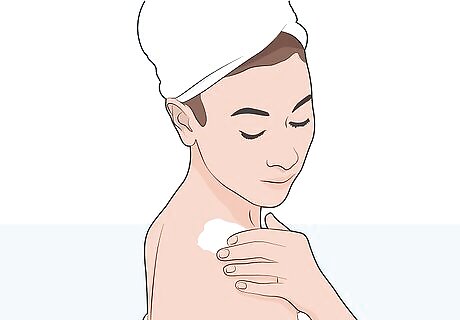
Apply an oil-based moisturizer to your skin after bathing and before bed. Choose an ointment or emollient cream that is specially made for soothing itchy skin. Things like petroleum jelly and mineral oil are the best options since they're made primarily of oil. If possible, look for oil-based moisturizers that have received the "National Eczema Association Seal of Acceptance." Apply it within 3 minutes of getting out of the shower and, if you shower early in the day, right before hopping in bed. Avoid using lotions since they're primarily made of water and evaporate quickly. However, if you only have lotions on hand, make sure they’re free of dyes, fragrances, and a potential allergen called Cocamidopropyl betaine. If you don't like how petroleum jelly or mineral oil feels on your skin, emollient cream is your next best option. Just check the ingredients list to make sure it doesn't contain fragrances or dyes that might irritate your skin. If you like to soak in the tub before bed, apply the cream within 3 minutes of patting your skin damp. Moisturizer will be most effective at relieving your nighttime itching if you apply it several times throughout the day as well as just before bed. This will help your skin retain moisture better.Tip: Coconut oil is a great, natural remedy for moisturizing your skin and getting rid of overnight itchiness. As a plus, you can use it for both your delicious meals and your skin!
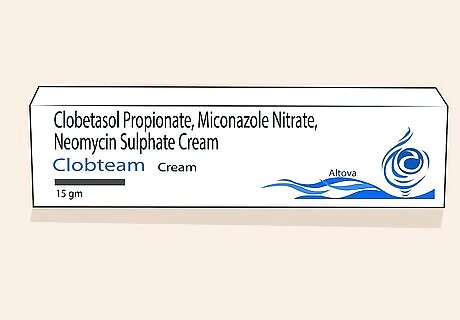
Apply corticosteroid cream or ointment before going to bed. Squeeze a pea-sized amount of hydrocortisone cream or ointment onto a clean finger and gently rub it onto the affected skin. If your doctor has prescribed you a corticosteroid cream or ointment, use that instead of over-the-counter options. Some common prescription creams include dexamethasone, methotrexate, triamcinolone, mometasone, and clobetasol. Stick to using thin layers, since using a thick layer won’t help the medication penetrate your skin better. For instance, if you have plaques on both elbows, take a pea-sized amount of steroid cream or ointment and divide it in 2. Gently massage it into the skin of both elbows to help it absorb. If you have extreme flare-ups, ask your doctor about taking corticosteroids in pill form. Just know that these have been linked to potential side effects like osteoporosis, high blood pressure, lower immunity, and cataracts.
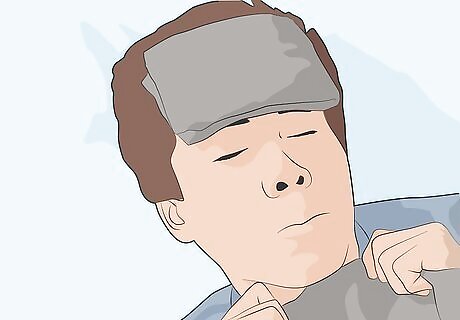
Wear a damp wrap overnight to soothe a severe flare-up. Blend together 1 cup (240 mL) of warm water and 1 tablespoon (15 mL) of apple cider vinegar. Soak strips of gauze or clean cotton fabric in the solution and wrap it around the area that's giving you trouble. Cover the damp wrap with a clean layer of cloth or a towel. You can wear it for 3 hours before bed or wear it overnight. Tuck the ends of the wrapping underneath the edges to help the wrapping stay on. Don't wrap it so tight that you feel lots of pressure. Just tight enough so that it stays on. Apple cider vinegar can help soothe inflammation and balance out the pH of your skin. It's best to do a damp wrap after bathing and applying ointment or cream.
Changing Your Environment
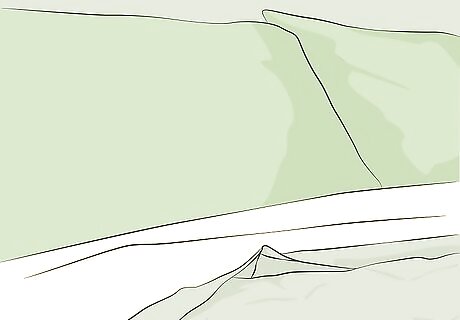
Sleep with cotton, bamboo, or silk pajamas and bedsheets. Check the labels on all of your pajama pants, shirts, and bedsheets to make sure they're made out of 100% cotton, bamboo, or silk. Avoid pajamas or sheets made from synthetic fibers, wool, polyester, and fleece because these can scratch the surface of your skin and lead to an even itchier situation. Silk and cotton will help the emollient cream and ointment soak into your skin. Silk pajamas and sheets can get really hot overnight, so be sure to fold down your quilt or comforter so you don’t wake up in a sweat.
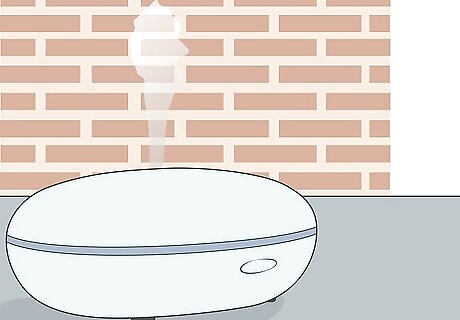
Use a cool-mist humidifier overnight. Set a cool-mist humidifier on your nightstand and leave it on overnight. If you live in a super dry area, leave it on during the day as well to increase the moisture in your home. Low humidity dries out your skin, which can make your flare-ups worse (especially in the winter). Be sure to clean your humidifier every day and disinfect it once a week so you don't have to deal with mold and mildew.
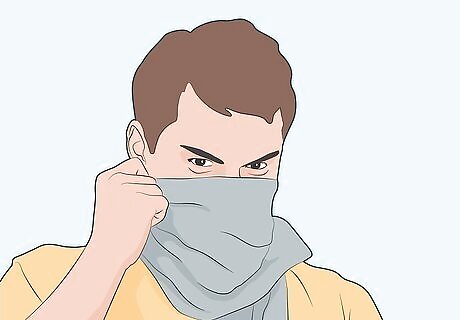
Stay away from pollen, dust mites, and pet dander at night. Allergens can signal your immune system to kick in and cause a flare-up, so it's best to avoid things like pollen, dust mites, and pet dander right before bed. Clean your home early in the day and keep any pets you have out of your bedroom. Some allergens, like a seasonal tree and grass pollen, are unavoidable, but do the best you can to keep the air in your home clean. Vacuuming at least every other day and changing out your A/C filters can go a long way in keeping allergens out of your home.
Getting Quality Sleep
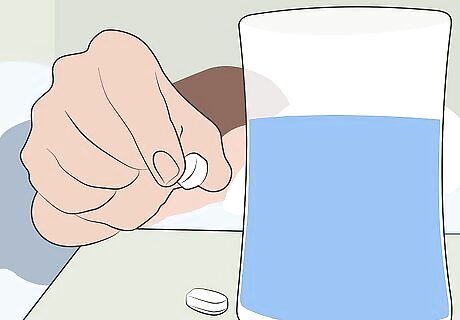
Take a natural sleep aid or nighttime antihistamine to fall asleep faster. Consider taking melatonin or a nighttime antihistamine that will make you fall asleep faster and, hopefully, stay asleep. Antihistamines containing diphenhydramine (like Benadryl, Aleve PM, and others) or doxylamine succinate (like Unisom SleepTabs) are good choices. If you’ve never taken melatonin, start with a 1-2 mg dosage. If that doesn’t do the trick, increase it by another 1-2 mg. Always talk to your doctor before taking any over-the-counter sleep aid or antihistamine.
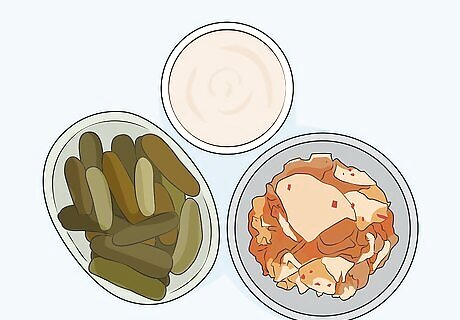
Eat some probiotic-rich foods at dinner or before bed. If you're feeling hungry before bed, snack on 5-6 oz. (141-170 g) of yogurt or 1/2 cup (64 g) of kimchi, or a few pickle spears. If you're not into fermented foods, talk to your doctor about taking a probiotic supplement. The extra probiotics help calm your immune system, which will keep you from getting itchy overnight. With your doctor's permission, choose a probiotic supplement that contains 3-50 billion CFU-d of Lactobacillus rhamnosus, Bifidobacterium lactis, and Lactobacillus.
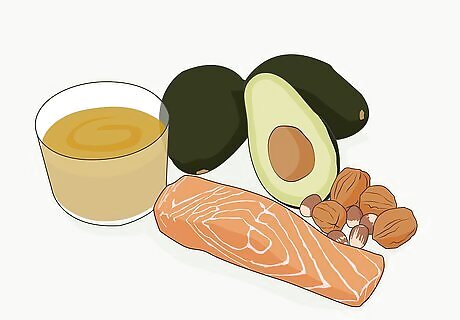
Eat anti-inflammatory, nutrient-rich foods throughout the day. In addition to eating probiotics in the evening, consider sticking to an eczema-friendly diet throughout the day. This means cutting out common allergens (like dairy, wheat, seafood, shellfish, soy, and some types of nuts) and opting for anti-inflammatory fruits, veggies, grains, and fats. Foods that are sugary or high in carbs can cause inflammation and flareups for some people. Stick to foods with a low glycemic index that won’t make your blood sugar spike. Some good options include bran cereals, certain fruits (such as apples, berries, citrus, and plums), beans and legumes, green vegetables, low fat dairy, and lean meats (like chicken and fish). Stay away from greasy fast food, heavily processed foods, and sugary or salty snacks, like candy or potato chips. It’s possible that taking vitamin D supplements could also help reduce your symptoms, although the relationship between vitamin D and eczema is still not completely clear. Talk to your doctor about whether you might benefit from vitamin D.

Sip on anti-inflammatory herbal teas to help soothe your mind and body. Choose decaf green, decaf oolong, chamomile, ginger, or turmeric tea. Toss a tea bag into some boiling water and let it steep for 3 to 5 minutes for the most benefits. Feel free to add a squeeze of lemon for some extra antioxidants and anti-inflammatory power! Valerian root, lavender, passionflower, and lemon balm teas are also great bedtime choices that will ease you into a good night’s rest.
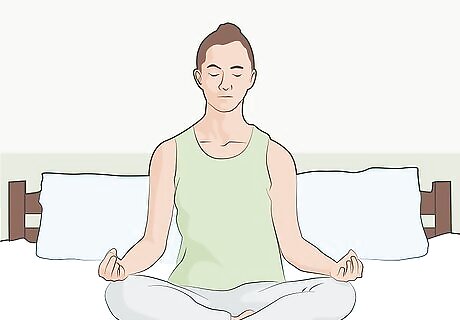
Manage your stress during the day and before bed. Stress can not only drive you nuts, but it’ll make it harder to go to sleep and stay asleep. Take at least 30 minutes before bed to wind down with some light stretching, meditation, relaxing music, or reading. Resist the urge to use your phone while you’re in bed because blue light from the screen can boost your energy. Consider starting a steady yoga routine to help keep stress to a minimum during the day and at night. Try 4-7-8 breathing to help you get to sleep faster: inhale through your nose for 4 seconds, hold it for 7, and exhale through your mouth for 8. Relaxing yogic meditation practices, like Yoga Nidra, can also help you unwind and relax for a better night’s sleep. Look for guided Yoga Nidra exercises online or sign up for a class at a local gym or studio.Tip: Progressive muscle relaxation is a great way to relax into deep, nourishing sleep. To do this, lie on your back in what's referred to as "corpse pose." Then, tense and relax your muscles in small groups at a time. Start from your forehead and work your way down to your toes. Hold the flex for 5 seconds before you relax your muscles and move to the next area. Remember to breathe slowly and deeply as you flex and relax each muscle group.
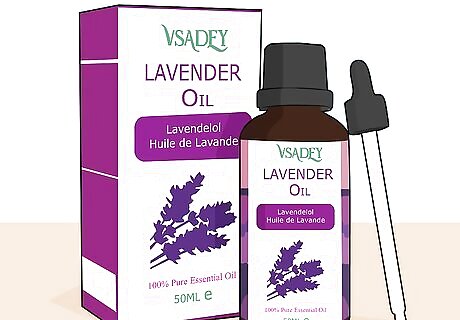
Apply lavender essential oil to relieve itching and boost relaxation. Lavender essential oil is a popular sleep aid, since many people find its scent soothing and relaxing. It may also help relieve your nighttime itching if you apply it as a topical treatment on your eczema. Mix 3 drops of pure lavender oil with 1 teaspoon (4.9 mL) of a carrier oil, such as olive, sweet almond, or jojoba oil. Apply the mixture directly to your affected skin at bedtime to get relief. Unfortunately, lavender oil can be irritating to some people. Test it in a small area first, such as a spot on the back of your knee, and wait a few hours to see if any irritation develops. Never apply pure lavender oil directly to your skin. Alternatively, you can also get the relaxing benefits of lavender by drinking it in an herbal tea or using a diffuser to fill your room with a soothing lavender scent.




















Comments
0 comment